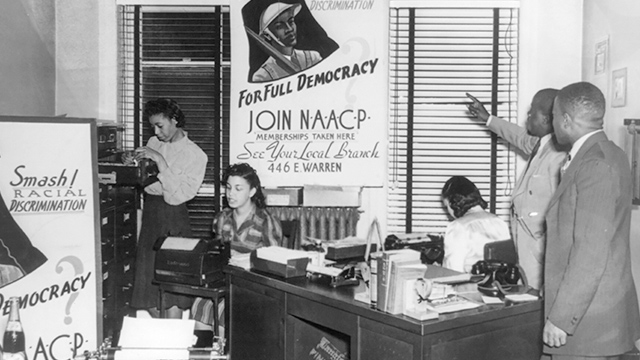Barriers To Black Freedom Were in Every Aspect of Society
Preventing Black Participation in Voting
Many methods were used to prevent Blacks and others from participating in the voting process. When legal methods came under attack, violence and murder took place. Violent acts included hangings and beatings, as well as threats to kill the children of a Black person who attempted to vote or register to vote. The literacy test was a legal method in which potential voters had to read from a book chosen by local authorities. These tests were unfairly administered, preventing even literate Blacks from voting. In some cases, Black applicants were forced to read from medical books, while white voters read from children’s books. Poor whites were sometimes allowed to pass or, in other cases, prevented from voting. Generally, if one was white and could pay a poll tax, they could register or vote. Authorities maintained lists of people who paid in advance, ensuring that payment became a barrier for others.
The Grandfather Clause and Legal Discrimination
It seems that madness driven by hate had no bounds. Between 1895 and 1919, voting was restricted through the Grandfather Clause, which allowed a person to vote if they or their ancestors were eligible before January 1, 1867. Of course, Blacks could not vote until the passage of the 15th Amendment in 1870, but this was sabotaged by racist public servants. This form of discrimination lasted until the Civil Rights Act of 1965, championed by Martin Luther King and the Civil Rights Movement. In towns with large Black populations, strict measures were applied to prevent Blacks from outvoting whites. Even if Blacks passed the literacy test, they still had to pay an annual poll tax.
The Spark of the Civil Rights Movement
The modern Civil Rights Movement was ignited by the murder of Emmett Till, a 14-year-old boy in Mississippi in 1955, and the protests that followed against racist violence and segregation.
Discrimination in Military Service
There was little relief from the brutal abuse that Blacks had to endure. After World War II and the Korean conflict, Black Americans grew dissatisfied with their second-class status. Despite this, they risked their lives on the battlefields in Germany, France, and the Philippines. Segregated units in the military subjected Black troops to discrimination, such as being given only one piece of letter-writing paper, while white soldiers received as much as they wanted.
Segregation in Churches and Housing
Laws and customs were enacted to prevent Blacks from attending white churches. In San Antonio, Blacks and Mexican Americans were prohibited from buying homes in the northern part of the city, enforced by deed restrictions. Across the nation, housing discrimination persisted both in the North and South. White citizen councils and white-only associations worked tirelessly to prevent nonwhites from moving into white neighborhoods. There was no democracy for people of color, ever.






